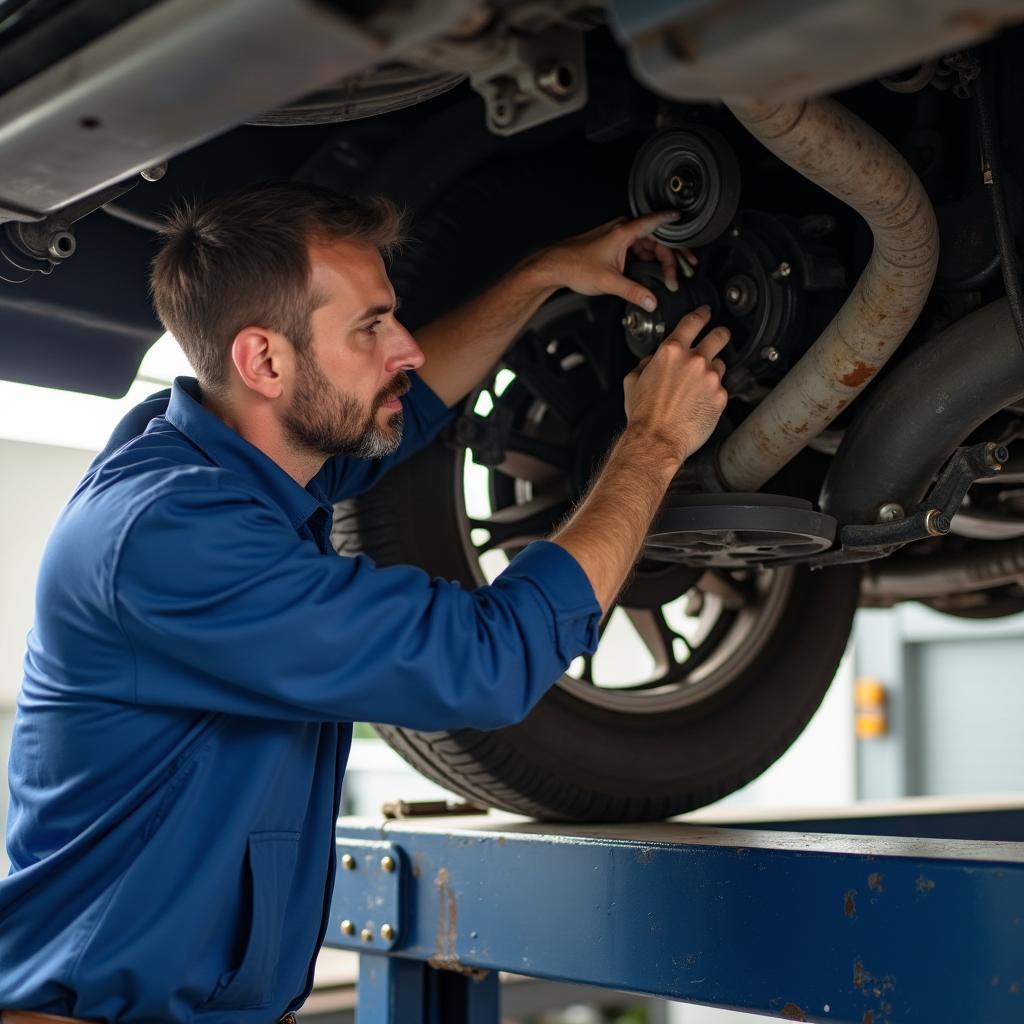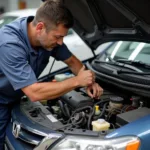Keeping your car running smoothly beyond 50,000 miles requires a proactive approach to maintenance. Understanding when to service your car beyond this milestone is crucial for its longevity, performance, and safety. Ignoring necessary services can lead to costly repairs down the road and potentially compromise your safety.
Understanding Your Car’s Needs After 50,000 Miles
As your car accumulates mileage, certain components experience wear and tear, requiring more frequent attention. While your owner’s manual provides a general maintenance schedule, factors like driving conditions, climate, and driving habits can influence the specific needs of your vehicle. Knowing When To Service Car Beyond 50k involves understanding these factors and recognizing the signs of potential problems.
Key Services for High-Mileage Vehicles
Several key services become particularly important after the 50,000-mile mark. These include:
- Timing Belt Replacement: Depending on the make and model, the timing belt may need replacement around this mileage. A broken timing belt can cause catastrophic engine damage.
- Spark Plug Replacement: Worn spark plugs can decrease fuel efficiency and engine performance.
- Transmission Fluid Change: Regular transmission fluid changes are essential for smooth shifting and preventing transmission problems.
- Coolant Flush: The cooling system needs to be flushed and refilled to prevent corrosion and overheating.
- Brake Inspection and Service: Brake pads and rotors wear down over time and require regular inspection and replacement.
Common Signs Your High-Mileage Car Needs Service
Beyond scheduled maintenance, there are several signs that your car might need immediate attention:
- Unusual Noises: Any new or unusual noises coming from the engine, transmission, or suspension should be investigated.
- Decreased Fuel Efficiency: A sudden drop in fuel economy can indicate a problem with the engine, fuel system, or transmission.
- Warning Lights: Never ignore warning lights on your dashboard. They are designed to alert you to potential problems.
- Vibrations: Unusual vibrations, especially when braking or accelerating, can indicate issues with the brakes, tires, or suspension.
- Fluid Leaks: Any leaks under your car should be checked immediately.
Extending the Life of Your High-Mileage Car
Proper maintenance is crucial for extending the life of your high-mileage vehicle. Here are some tips to keep your car running smoothly:
- Follow the Recommended Maintenance Schedule: Adhering to the manufacturer’s recommended maintenance schedule is the best way to prevent problems.
- Use High-Quality Fluids and Parts: Using high-quality fluids and parts can significantly improve the longevity and performance of your vehicle.
- Address Issues Promptly: Don’t ignore warning signs or postpone necessary repairs. Addressing issues promptly can prevent them from becoming more serious and costly.
“Regular maintenance is like an investment in your car’s future,” says John Miller, a certified master mechanic with over 20 years of experience. “It’s much cheaper to prevent problems than to fix them after they’ve occurred.”
 Mechanic Performing Car Maintenance
Mechanic Performing Car Maintenance
Conclusion
Knowing when to service your car beyond 50,000 miles is essential for its continued reliability and performance. By understanding your car’s specific needs, recognizing warning signs, and adhering to a regular maintenance schedule, you can keep your vehicle running smoothly for years to come. Don’t neglect your car’s maintenance needs, especially after the 50k mark.
“Ignoring maintenance is like playing Russian roulette with your car,” adds Sarah Johnson, an automotive engineer with over 15 years of experience in the industry. “You might get lucky for a while, but eventually, something will go wrong.”
FAQ
- How often should I change my oil after 50,000 miles? Follow your owner’s manual recommendations.
- Is it more expensive to maintain a high-mileage car? Not necessarily, but certain repairs might become more common.
- What should I do if my check engine light comes on? Have it checked by a qualified mechanic as soon as possible.
- How can I improve my car’s fuel efficiency? Regular maintenance, proper tire inflation, and efficient driving habits can help.
- What are some common problems with high-mileage cars? Issues with the transmission, suspension, and cooling system can become more prevalent.
- How do I know if my timing belt needs to be replaced? Consult your owner’s manual or a qualified mechanic.
- What is the importance of regular transmission fluid changes? It helps prevent transmission problems and ensures smooth shifting.
Need more assistance? Contact us via WhatsApp: +1(641)206-8880, or Email: [email protected]. Our customer service team is available 24/7.
